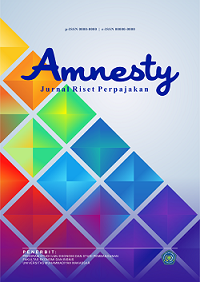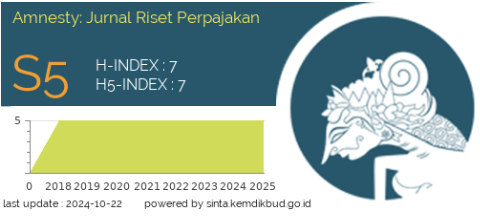Implementation Of Input Tax Prepopulated Data And Vat E-Spt In Increasing Value Added Tax Reporting Agency Tax Registered At Kpp Pratama Bulukumba
DOI: https://doi.org/10.26618/jrp.v5i1.7502
Prepopulated Tax Data, dan e-SPT
Abstract
Prepopulated Input Tax Data and Electronic Notification Letters (e-SPT) The PNN period is one part of the modernization process of Tax administration, so that taxpayers have the convenience of fulfilling and completing their obligations, so that the fulfillment of their tax obligations can be completed easily in their implementation, and the aim is to create an orderly and transparent tax administration. The purpose of this study is to determine the application of prepopulated input tax data and e-SPT Period of VAT in increasing the value added tax reporting of corporate taxpayers. The method used in this research is descriptive research type. To obtain the necessary data, the authors carried out data collection activities for 2018-2021, by interviewing Mr. Dwi Bagas Widianto as the System Administrator or the Data Quality Assurance Section. The results of this study indicate that the application of prepopulated tax data and e-SPT for the VAT period is very effective and efficient at KPP Pratama Bulukumba, it can be seen from the increase in Value Added Tax reporting and the use of the Prepopulated data system and e-SPT for the VAT period which is increasing every year. It is hoped that the Directorate General of Taxes and their regional offices should be able to improve their performance, including by providing counseling about the importance of paying taxes on time, and providing the best services, especially for taxpayers.
References
Ardiani. 2017. Akuntansi Pajak, Profil Kantor Pelayanan Pajak Pratama Bulukumba. KPP Bulukumba,Jakarta.
Adil, M. (2022). Accountability and Transparency in the Public and Private Sector. International Journal Of Humanities Education and Social Sciences (IJHESS), 1(6).
Adiningrat, A. A., Ruhayu, Y., Rustan, R., Wahyuni, S., & Fitrianti, A. N. (2022). The Effect of Financial Literature and Islamic Work Motivation on the Performance of Food Micro, Small and Business Enterprises (MSMEs) in Makassar City. Budapest International Research and Critics Institute-Journal (BIRCI-Journal), 5(4), 30836-30845.
Adiningrat, A. A., & Warda, W. (2023). The Development of Intensity Model on Technopreneurship to Improve Turnover in Micro, Small and Medium Enterprises (MSMEs) Culinary in Makassar, Indonesia. International Journal of Economics Development Research (IJEDR), 4(2), 218-228.
Abdi, M. N., Suarni, A., & Arham, A. (2022). Analisis Kepailitan Perusahaan Yang Tercatat di BEI Sub Sektor Telekomunikasi. Jurnal Multidisiplin Madani, 2(6), 2705-2716.
Arman, A. (2021). Analysis of Motor Vehicle Tax Revenues before and after the Tax Kring. Point of View Research Accounting and Auditing, 2(2), 144-149.
Arman, A., & Mira, M. (2021). Does Tax Avoidance Make Do Earning Opacity?. Atestasi: Jurnal Ilmiah Akuntansi, 4(1), 88-95.
Arman, A., Mira, M., Masrullah, M., Agustan, A., Firmansyah, F., & Aditya, R. (2023). Financial Literacy and Assistance in Compiling Independent Financial Reports Using Expense IQ Money Manager. Technium Sustainability, 4, 7-12.
Arsal, M. (2021). Impact of earnings per share and dividend per share on firm value. ATESTASI: Jurnal Ilmiah Akuntansi, 4(1), 11-18.
Arsal, M., & Arsal, D. (2019, August). Urban forest and financial resources perspective in Indonesia. In IOP Conference Series: Materials Science and Engineering (Vol. 593, No. 1, p. 012006). IOP Publishing.
Arsal, M., HAMID, N. I. N. B. A., Arsal, R., & Basri, M. (2014). Consumer Behavior of the Islamic banking. International Journal of Science Commerce and Humanities, 59-64.
Arniati, A., Arsal, M., Akhmad, A., Asdar, A., & Adiningrat, A. A. (2020). Impression of Student Knowledge on Decisions Become a Customer of Islamic Banks. International Journal of Business Economics (IJBE), 1(2), 145-152.
Hutagaluh, O., Rustam, A., Sangadji, S. S., Baharuddin, I., & Kurniullah, A. Z. (2020). Responsive Leadership in Preventing Transmission of Covid-19 in the Indonesia-Malaysia Border Area.
RUM, M., ARSAL, M., KHALID, A., & AWALUDDIN, M. (2023). The Distribution of Tax Collectability, Quality of Tax Services Efforts to Tax Coverage Ratio. 유통과학연구 (JDS), 21(6), 107-117.
Rustan, R., Adiningrat, A. A., & Aisyah, S. (2023). Optimizing of Resources Utilization Through Islamic Spiritual Entrepreneurship to Improve The Welfare of Coastal Communities. International Journal of Economics Development Research (IJEDR), 4(2), 170-180.
Rustan, S. A., Aisyah, S., Adiningrat, A. A., Rustam, A., & Anggoro, M. Y. A. R. (2022). Strengthening Of Marketing Information Systems and Accounting Information Systems for Micro Small and Medium Enterprises (UMKM) Food Culinary Makassar. Budapest International Research and Critics Institute-Journal (BIRCI-Journal), 5(4), 30580-30585.
Suarni, A., & Amelia, R. (2023). Analysis of Mosque Financial Management in Ujung Bulu District, Bulukumba Regency, South Sulawesi, Indonesia. Public Sector Management and Accounting Research, 2(2), 10-22.
Alim, Seiadi. 2018. e-SPT Tahunan PPh Badan, Edisi Pertama, Graha Ilmu.Yogyakarta.
Handayani, Kadek. 2013. E-Jurnal Akutansi. Pengaruh Evektifitas e-SPT masa PPN pada Kepatuhan Wajib Pajak Badan di KPP Pratama DenpasarBarat. Bali:Universitas Udayana.
Jakijan dan Khairani. 2013. Analisis Aplikasi E-Spt Ppn Pada Kantor Konsultan Pajak Madya Palembang. Palembang: Jurusan Akuntansi STIE MDP.
Keputusan Direktur Jendral Pajak Nomor KEP-88/PJ/2004 tentang Penyampaian Surat Pemberitahuan Secara Elektronik.2004.Jakarta: Direktur Jendral Pajak.
Mardiasmo. 2016. Perpajakan, Edisi Terbaru 2016, Andi, Yogyakarta.
Permata, Indah. 2016. Jurnal Perpajakan (JEJAK). Dampak Penerapan Surat Pemberitahuan Masa Elektronik (e-SPT) Terhadap Efektivitas dan Penerimaan Pajak Pertambahan Nilai. Pratama Baru.
Purwono, Herry. 2010. Dasar-Dasar Perpajakan dan Akuntansi Pajak.
Erlangga.Jakarta.
Radianto, ED Wirawan. 2010. Memahami Pajak Penghasilan. Graha Ilmu.Yogyakarta
Sari, Diana. 2014. Konsep dan Teori Aplikasi Pajak Penghasilan, Edisi Pertama,Mitrawacanamedia. Bekasi Jawa Barat.
Sakti dan Hidayat, 2015:123. Faktur Pajak Elektronik atau yang biasa di sebut e- Faktur adalah faktur pajak yang di buat dengan melalu aplikasi atau sistem elektronik yang di tentukan atau yang di sediakan Direktorat Jenderal Pajak.
Suandy, Erly. 2016. Hukum Pajak, Edisi 7, Salemba Empat. Jagakarsa, Jakarta Selatan.
Waluyo. 2010. Perpajakan Indonesia. Edisi 1, Salemba Empat. Jakarta.
Waluyo. 2010. Perpajakan Indonesia. Edisi 2, Salemba Empat. Jakarta.
(www.news.ddtc.co.id/apa-itu-prepopulated-pajak- masukan-/21Mei 2021/16.15)
(www.online-pajak.com/tentang-ppn-efaktur/pajak-pertambahan-nilai- ppn/23 2021/14.23)
(www.mas-software.com/blog/e-spt/ 23 Mei 2021/ 23.15)
(www.cpssoft.com/blog/pajak/pengelompokan-dan-jenis-pajak-di-indonesia/09 july 2021/ 20.06)
(www.pajak.go.id/artikel/elektronik-spt/12 july 2021/05.09)




